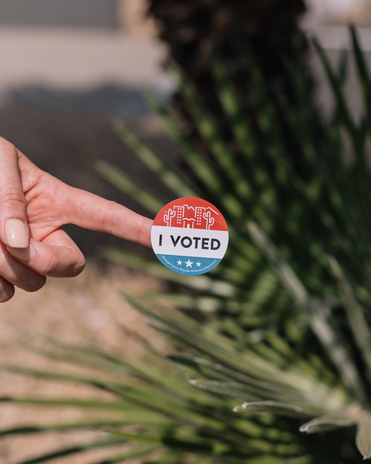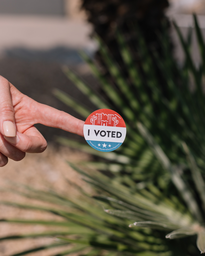Voting can be an extremely daunting task. Trust me, I get it. I made my dad come with me the first time I voted because what if something went wrong? What if I went to the wrong place? What if it wasn’t open? What if they started interrogating me with questions I couldn’t answer? What if I couldn’t figure out how to use the machine? None of that happened. I was in and out within five minutes.
Although scary, voting really is important. I’m not going to sit here and lecture you about your “civic duty” as an American citizen like every other adult in your life has. At the end of the day, you are going to do whatever you want, and if you don’t want to vote, no one can make you. But I am going to tell you that the 2020 election had the highest voter turnout rate in American history: 66%. I don’t know about you, but I wouldn’t consider that a “good” turnout rate. That’s only ⅔ of the eligible voting population. To top that off, people aged 18-29 are consistently one of the least likely age groups to vote. Now I KNOW this is not because young people don’t care about politics. I can open any social media app to figure that out.
I think the problem lies in the fact that out of all the adults that tell you how important voting is, very few of them will actually take the time to explain the process to you. I am going to try to explain the voting process as simply as possible so you can feel more confident come election time.
How to Register to Vote
Registering to vote is by far the easiest part of the voting process. It literally took me three, maybe four, minutes.
What to know before you start: your place of birth, social security number, and driver’s license number.
Step 1: This link will take you to a website that will register you in whichever state you put in the address line.
Step 2: Fill out all of the questions.
Step 3: Submit.
There is NO DIFFERENCE between registering to vote on that link or through your state’s website. But, if you prefer to register directly with your state, google “State Name register to vote” and make sure it’s a government website (ends in .gov).
Note that many states require you to be registered to vote about a month before an election, so make sure you do it ahead of time. To find out how long you need to register before an election, click here, choose your state from the drop-down menu, and click “Find out how to Register.” It will be under the “Voter Registration Deadlines” heading.
Also, note that picking a party affiliation is absolutely not necessary and is completely up to your discretion. It can always be changed. Being affiliated with a party only really helps if you live in a state with closed primary elections (see What are the Different Types of Elections?).
How to Vote
Where you go to vote depends on your voting district. To find your district, google “State Name polling place locator” and make sure you are using a government website (ends in .gov). Most districts hold elections in churches, schools, and other public places. You can also ask people who live in your house who have voted before (parents, siblings, etc.)
Most states require a photo ID when you go to the polls. They will ask for it when you check-in, and the person will verify it with your ID and cross off your name. They will direct you to a booth where you can go in and cast your vote. Once you’re done, leave the booth, get your sticker, and congratulations, you just voted.
Depending on the type of election and the population density of your district, you may have to prepare yourself to wait in line.
Note that ALL elections take place by mail in these 8 states: California, Colorado, Hawaii, Nevada, Oregon, Utah, Vermont and Washington. As long as you are registered, you will receive your ballot in the mail. All you have to do is fill it out and send it back. This also applies if you registered for an absentee (mail-in) ballot (see What if I Go to College Out of State?).
What if I Go to College Out of State?
College students can vote in either their home state or the state they attend college, but NOT BOTH. It is ILLEGAL to be registered to vote in more than one state. In my opinion, getting registered in your home state is much easier, but do what you want.
If you are out of state during an election, you can register for an absentee ballot ahead of time. An absentee ballot is simply a ballot you get in the mail, fill out, then send back. It is counted the same as a regular ballot. Most states allow anyone to vote by mail for any reason, but some will need a reason.
To register for an absentee ballot and also see the rules for your state, visit this link and select your state from the drop-down menu. Usually, there will be a PDF provided for you to print and fill out. Sometimes, they will mail the application to you instead. All you need is a postage stamp to mail back to your county clerk (they will give you the mailing address).
What are the Different Types of Elections?
Congressional elections
Senator: each state has two senators who serve a term of six years. Every two years, ⅓ of senators go up for reelection. So, every two years, there is a senate election somewhere in the country, but it may not be for your state.
House members: House members serve two year terms and are up for reelection every even year.
Local elections
City and county officials.
Primaries
These are the elections where you pick the candidate who will be running for president under their party. To further explain, in 2020, Joe Biden won the Democratic primary, which is why he was the democratic candidate on the ballot. Donald Trump won the Republican primary, which is why he was the republican candidate on the ballot. These are especially important if you are a staunch member of a certain political party and want a say on who will represent your party in the presidential election.
Each state has different types of primaries. Here is a breakdown of what they all mean:
Open primary: you may vote in any primary election, no matter your affiliation. You also may vote in more than one primary (ex, you are a registered Democrat, but you can vote in the Democratic and Republican primary)
Closed primary: you may only vote in the primary, which aligns with your party affiliation you choose when registering to vote. If you are unaffiliated, you cannot vote in the primaries at all. (ex: you are a registered Democrat, which means you can only vote in the Democratic primary. You are not allowed to vote in the Republican primary.)
Semi closed primary: you may only vote in the primary, which aligns with your party affiliation you choose when registering to vote. If you are unaffiliated, you can choose which primary you would like to vote in, but only one. (ex, you did not choose a political party when you registered to vote, so, for this year’s primaries, you choose to vote in the Republican one.)
To see what type of primaries your state holds, check out this map
Presidential election
You do NOT have to vote for the candidate who is running under the party you are registered as. If you are registered as a Republican, you reserve the right to vote for a Democrat or a candidate of any other party.
Elections Coming Up
The biggest election coming up is the Republican presidential primary on January 15th, 2024. The current members running (subject to change) are:
Donald Trump
Ron Desantis
Chris Christie
Nikki Haley
Mike Pence
Vivek Ramaswamy
Tim Scott
Doug Burgum
If you want to know what local elections are coming up in your state, click here.


